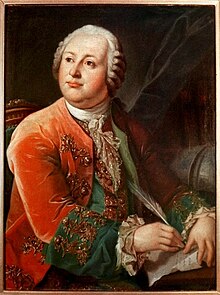Mikhail Lomonosov
| Mikhail Lomonosov | |
|---|---|

Portrait by G. Prenner, 1787
|
|
| Native name | Михаил Васильевич Ломоносов |
| Born | Mikhail Vasilyevich Lomonosov 19 November 1711 Denisovka, Archangelgorod Governorate, Russia |
| Died | 15 April 1765 (aged 53) Saint Petersburg, Russia |
| Nationality | Russian |
| Fields | Natural science, chemistry, physics, mineralogy, history, philology, poetry, optics |
| Institutions | St. Petersburg Academy |
| Alma mater |
Slavic Greek Latin Academy St. Petersburg Academy University of Marburg |
| Academic advisors | Christian Wolff |
| Spouse | Elizabeth Christine Zilch |
Mikhail Vasilyevich Lomonosov (/ˌlɒməˈnɔːsɔːf, -sɒf/;Russian: Михаи́л Васи́льевич Ломоно́сов; IPA: [mʲɪxɐˈil vɐˈsʲilʲjɪvʲɪtɕ ləmɐˈnosəf]; November 19 [O.S. November 8] 1711 – April 15 [O.S. April 4] 1765) was a Russian polymath, scientist and writer, who made important contributions to literature, education, and science. Among his discoveries were the atmosphere of Venus and the Law of Mass Conservation in chemical reactions. His spheres of science were natural science, chemistry, physics, mineralogy, history, art, philology, optical devices and others. Lomonosov was also a poet and influenced the formation of the modern Russian literary language.
Lomonosov was born in the village of Denisovka (later renamed Lomonosovo in his honor) in Archangelgorod Governorate, on an island not far from Kholmogory, in the far north of Russia. His father, Vasily Dorofeyevich Lomonosov, was a prosperous peasant fisherman turned ship owner, who amassed a small fortune transporting goods from Arkhangelsk to Pustozyorsk, Solovki, Kola, and Lapland. Lomonosov's mother was Vasily's first wife, a deacon's daughter, Elena Ivanovna Sivkova.
...
Wikipedia
